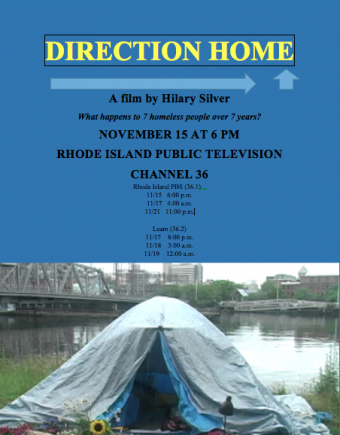PROVIDENCE, R.I. [Brown University] — A new film by Hilary Silver, professor of sociology and urban studies and professor of public policy, premiered on PBS Sunday. Direction Home, follows seven homeless people over seven years, after they lose their shelter in 2007 to plans for a new State Police Headquarters that was ultimately never built on the site. The film tracks the seven characters and chronicles the efforts of housing activists, tent city residents, and service providers, and addresses some of the common issues surrounding homelessness.
“There are many misconceptions and fears about people experiencing homelessness,” Silver said. “I hope viewers will come to relate to the homeless as individual human beings and fellow citizens who have suffered misfortunes and deserve respect, understanding, and compassion.
The film was made with the support of the Rhode Island Council for the Humanities and Brown University and the assistance of Brown University students. It is scheduled to be shown on PBS Nov. 15, 17, and 21, and on the Learn channel Nov. 17-19, 2015.
Direction Home is a spinoff of Silver’s first film, Southside. Silver began her work on the film after noting an increase in homeless facilities in South Providence and learning of the closing of the Welcome Arnold shelter, where the main characters in Direction Home lived. Students in Silver’s urban studies seminar, “Housing and Homelessness,” also got involved with the research and making of the film, interviewing Welcome Arnold residents about their plans and talking to local tent city residents for research on the repeated displacement of the homeless.
During the making of Direction Home, Silver worked hard to track and stay into touch with the residents she met at Welcome Arnold, asking about them on the streets or in agencies to make sure they were all right. Over the course of seven years, however, two of the original Welcome Arnold residents interviewed died, as did two of the activists portrayed in the film.
“As viewers will vividly see, homelessness takes a serious toll on people’s health and well-being. Ending it will save lives,” Silver said.

